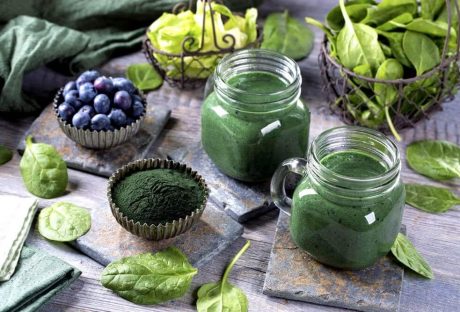Tag: spirulina

Spirulina: The Complete Plant Based Protein Source | Health Benefits
Spirulina is one of the oldest life forms on earth known for the longest as an endurance booster. It is in fact among the most popular health supplements in today’s time considering it is one of the first plant-based foods in the human diet. Surprising right? But what actually makes this ingredient a star among the ‘complete protein’ plant-based food sources? And does it even stand up to the fame it receives? Well, here’s our effort to give you evidence around spirulina’s health benefits and the status it holds. Spirulina: The Nutrient-Dense Food Spirulina happens to be a superfood high in many nutrients. Let’s have a look at its origin? A type of cyanobacteria, originally from the family of single-celled microbes known as the blue-green algae. This is an organism that grows both in fresh and saltwater What makes it plant-based is its ability to produce energy from sunlight through photosynthesis. Lesser-Known Fact: Spirulina gained massive popularity when NASA used it as a dietary supplement for astronauts on space missions. Really cool right? It has to be its ability to regulate immune functions and its anti-inflammatory properties which take place by the release of histamine by mast cells. What about the ideal dosage? One can opt for a standard dose of 1-3g of this green superfood but this can go up to 10g per day. Here’s a look at the nutrient profile of 10g of dried spirulina powder: Protein: 5.7 g Vitamin B1 (thiamine): 22% of the RDA Vitamin B2 (riboflavin): 33% of the RDA Vitamin B3 (niacin): 9% of the RDA Copper: 68% of the RDA Iron: 15-16% of the RDA Calories: 29 Carbs: 2.0g Moreover, this superfood actually includes almost some amount of every other nutrient that you need along with an optimal amount of magnesium, potassium, and manganese. Here’s a suggestion! If you are looking to skip eggs, spirulina could be a great replacement for a comparable amount of protein considering it also has all essential amino acids required by the body. Spirulina: The Powerful Antioxidant With Anti-Inflammatory Properties As we mentioned earlier, it is because of the anti-inflammatory properties that even NASA considered it as a superfood for astronauts. Here’s what you need to know! Chronic inflammation happens as oxidative damage harms our DNA and cells, resulting in diseases sometimes as lethal as cancer. The presence of antioxidants in spirulina help protect against this oxidative damage. Interesting fact: The antioxidant substance ‘phycocyanin’ happens to be the main component and gives spirulina the unique blue-green color. Health Impact Of Spirulina: A lot of people are using this superfood that can improve heart health further reducing risks of heart diseases. For those of you who aren’t aware of its powerful health benefits, studies on spirulina have shown that it lowers “bad” LDL cholesterol and Triglyceride Levels. It also increases “good” HDL cholesterol impacting heart health in a positive way. Let us provide scientific evidence to build your trust- Although most studies have shown favorable results mainly with a dosage of 4.5-8g per day yet, A study was conducted on 25 people who were suffering from type 2 diabetes. It was later discovered that only 2g of spirulina per day, significantly showed a reduction in the blood sugar levels. There was another study on people with high cholesterol which determined that 1 g of spirulina per day resulted in lowered triglycerides by 16.3%. Furthermore, there was a reduction in the “bad” LDL by 10.1%. In addition, research has shown that spirulina may have anti-cancer properties and is especially effective against a type of precancerous lesion of the mouth called OSMF. Spirulina May Improve Muscle Strength & Endurance: Often experience muscle fatigue when exercising? The reason is exercise-induced oxidative damage. People into fitness and athletics consume plant-based foods with antioxidants to minimize this damage. Few studies emerged showing spirulina as food for significantly reducing the fatigue time and improving muscle strength and endurance. Can Spirulina Reduce Blood Pressure? Heart attack, strokes, and chronic kidney disease are some of the serious diseases driven by high blood pressure. An optimal amount of spirulina for e.g. 4.5g-8g per day has shown to reduce blood pressure in individuals with normal levels. What might be the possible reason behind this reduction in blood pressure? Spirulina leads to an increase in the production of nitric oxide (that is otherwise massively produced by plant-based sources like beetroot which are rich in nitrates that convert to nitric oxide) leading to a lowered blood pressure. Nitric oxide is a signaling molecule that aids blood vessels to relax and dilate, positively affecting blood levels. The Final Verdict: Spirulina’s title as a superfood that is ‘nutrient-dense stands true along with the crazy health benefits it has to offer. As mentioned above, spirulina suppresses oxidation while reducing blood pressure and lowering blood sugar. It also improves blood lipids and may have anti-cancer properties. One can simply consume spirulina in tablets and powder form. There are supplements widely available and used for their amazing health benefits. If you want the goodness of spirulina along with other green vitamins then you can check out bGreen's super greens and fruits that help you bridge the daily gap in your nutrition. Read Also: Living With Diabetes – What are the Possible Complications? Why is a random blood sugar test prescribed? Top Health Benefits Of Drinking Beer According To Experts Are CBD Lotions Good For Your Skin?
READ MOREDetails















